中国文化典籍英语翻译及赏析37:元曲杂剧《窦娥冤(节选)》
《窦娥冤》英译本读后思考
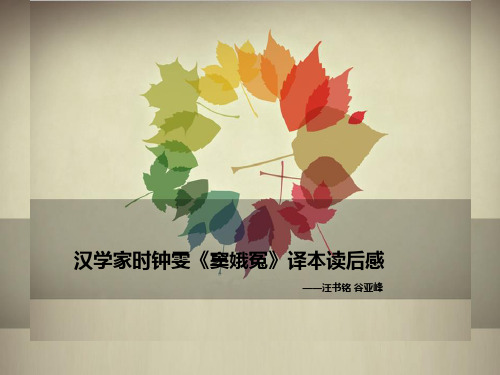
然而,反观杨译本cry out(大叫、叫喊)一词,只单单描写出窦娥向天地诉说的
情景,我们把杨译本进行回译:我向天地大声诉说我的不公,可以看出杨译本并没有 把原文中的“动地惊天”体现出来,从而也就不如时译本更能翻译出窦娥坚强不屈、
抗争到底的光辉形象。
参考文献:
[1] 顾森、李崇月. 浅谈词牌名的翻译——以毛泽东诗词英译本为例[J] [2] 胡庚申. 从术语看译论——翻译适应选择论概观[J]
1.词牌名的翻译 端正好,弹词曲牌。弹词传唱的为小曲,与北曲所属正宫、仙吕宫词曲不同, 词格也各异。曲调庄重、肃穆,无语助词。散唱 2. 韵脚问题
3. 音节语速流问题
窦娥具有顽强的反抗到底的精神,“窦娥具有不屈不挠的反抗性,她勇 敢地战斗,积极地抗争。”(关星飞:1988) 例:没来由犯王法,不提防(葫芦提)遭刑宪。叫声屈动地惊天,我将 天地合埋怨。 Though no fault of mine I am called a criminal, And condemned to be beheaded-I cry out to Heaven and Earth of this injustice!(杨译) For no reason,I am found guilty by imperial law; unexpectedly,I suffer punishment. My cry of injustice startles Heaven and Earth!(时译)
从两个角度看: • 交际翻译理论/翻译适应选择论 • 译本的接受度
曲牌继承词牌形式, 每一曲牌均有自己的曲调和情调, 以及 和这个曲调相应的曲词, 包括段,句,字数,韵的部位,字的四 声阴阳等, 这就是填词所必须遵循的格律。曲有曲牌和宫调,曲 牌规定了曲子的句数、字数、平仄、押韵格式,就像乐谱。宫调就 像现在的G大调、C调等等。 曲牌的牌名来源不一, 但大量的是继承了唐宋大曲,词牌,诸 宫调,唱赚等原有名称。 例如: 有的以地方命名, 如[梁州序],[伊州令]; 有的以曲牌节拍,节奏及音乐特点命名, 如[急板令],[节节 高],[双声子]; 有的以曲式命名, 如[三段子],[四换头];
元代-关汉卿《窦娥冤(节选)》原文、译文及注释
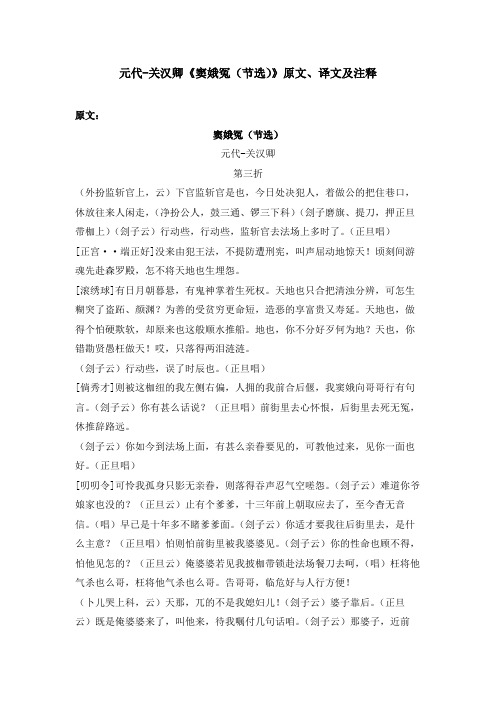
元代-关汉卿《窦娥冤(节选)》原文、译文及注释原文:窦娥冤(节选)元代-关汉卿第三折(外扮监斩官上,云)下官监斩官是也,今日处决犯人,着做公的把住巷口,休放往来人闲走,(净扮公人,鼓三通、锣三下科)(刽子磨旗、提刀,押正旦带枷上)(刽子云)行动些,行动些,监斩官去法场上多时了。
(正旦唱)[正宫··端正好]没来由犯王法,不提防遭刑宪,叫声屈动地惊天!顷刻间游魂先赴森罗殿,怎不将天地也生埋怨。
[滚绣球]有日月朝暮悬,有鬼神掌着生死权。
天地也只合把清浊分辨,可怎生糊突了盗跖、颜渊?为善的受贫穷更命短,造恶的享富贵又寿延。
天地也,做得个怕硬欺软,却原来也这般顺水推船。
地也,你不分好歹何为地?天也,你错勘贤愚枉做天!哎,只落得两泪涟涟。
(刽子云)行动些,误了时辰也。
(正旦唱)[倘秀才]则被这枷纽的我左侧右偏,人拥的我前合后偃,我窦娥向哥哥行有句言。
(刽子云)你有甚么话说?(正旦唱)前街里去心怀恨,后街里去死无冤,休推辞路远。
(刽子云)你如今到法场上面,有甚么亲眷要见的,可教他过来,见你一面也好。
(正旦唱)[叨叨令]可怜我孤身只影无亲眷,则落得吞声忍气空嗟怨。
(刽子云)难道你爷娘家也没的?(正旦云)止有个爹爹,十三年前上朝取应去了,至今杳无音信。
(唱)早已是十年多不睹爹爹面。
(刽子云)你适才要我往后街里去,是什么主意?(正旦唱)怕则怕前街里被我婆婆见。
(刽子云)你的性命也顾不得,怕他见怎的?(正旦云)俺婆婆若见我披枷带锁赴法场餐刀去呵,(唱)枉将他气杀也么哥,枉将他气杀也么哥。
告哥哥,临危好与人行方便!(卜儿哭上科,云)天那,兀的不是我媳妇儿!(刽子云)婆子靠后。
(正旦云)既是俺婆婆来了,叫他来,待我嘱付几句话咱。
(刽子云)那婆子,近前来,你媳妇要嘱付你话哩。
(卜儿云)孩儿,痛杀我也!(正旦云)婆婆,那张驴儿把毒药放在羊肚儿汤里,实指望药死了你,要霸占我为妻,不想婆婆让与他老子吃,倒把他老子药死了。
窦娥冤翻译及原文
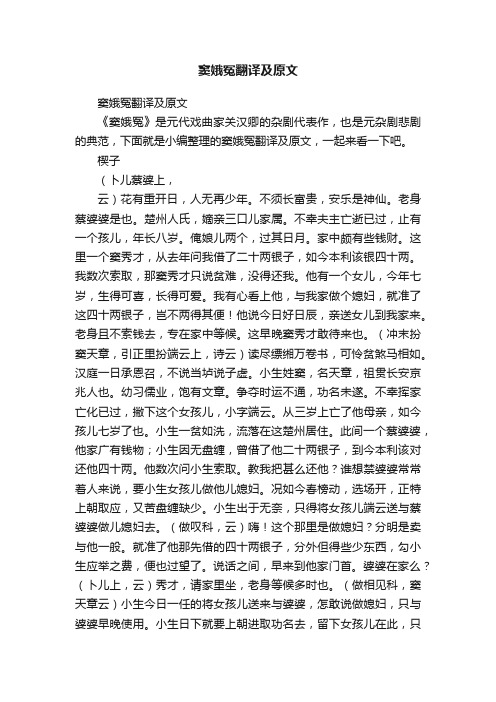
窦娥冤翻译及原文窦娥冤翻译及原文《窦娥冤》是元代戏曲家关汉卿的杂剧代表作,也是元杂剧悲剧的典范,下面就是小编整理的窦娥冤翻译及原文,一起来看一下吧。
楔子(卜儿蔡婆上,云)花有重开日,人无再少年。
不须长富贵,安乐是神仙。
老身蔡婆婆是也。
楚州人氏,嫡亲三口儿家属。
不幸夫主亡逝已过,止有一个孩儿,年长八岁。
俺娘儿两个,过其日月。
家中颇有些钱财。
这里一个窦秀才,从去年问我借了二十两银子,如今本利该银四十两。
我数次索取,那窦秀才只说贫难,没得还我。
他有一个女儿,今年七岁,生得可喜,长得可爱。
我有心看上他,与我家做个媳妇,就准了这四十两银子,岂不两得其便!他说今日好日辰,亲送女儿到我家来。
老身且不索钱去,专在家中等候。
这早晚窦秀才敢待来也。
(冲末扮窦天章,引正里扮端云上,诗云)读尽缥缃万卷书,可怜贫煞马相如。
汉庭一日承恩召,不说当垆说子虚。
小生姓窦,名天章,祖贯长安京兆人也。
幼习儒业,饱有文章。
争夺时运不通,功名未遂。
不幸挥家亡化已过,撇下这个女孩儿,小字端云。
从三岁上亡了他母亲,如今孩儿七岁了也。
小生一贫如洗,流落在这楚州居住。
此间一个蔡婆婆,他家广有钱物;小生因无盘缠,曾借了他二十两银子,到今本利该对还他四十两。
他数次问小生索取。
教我把甚么还他?谁想禁婆婆常常着人来说,要小生女孩儿做他儿媳妇。
况如今春榜动,选场开,正特上朝取应,又苦盘缠缺少。
小生出于无奈,只得将女孩儿端云送与蔡婆婆做儿媳妇去。
(做叹科,云)嗨!这个那里是做媳妇?分明是卖与他一般。
就准了他那先借的四十两银子,分外但得些少东西,勾小生应举之费,便也过望了。
说话之间,早来到他家门首。
婆婆在家么?(卜儿上,云)秀才,请家里坐,老身等候多时也。
(做相见科,窦天章云)小生今日一任的将女孩儿送来与婆婆,怎敢说做媳妇,只与婆婆早晚使用。
小生日下就要上朝进取功名去,留下女孩儿在此,只望婆婆看觑则个!(卜儿云)这等,你是我亲家了。
你本利少我四十两银子,兀的是借钱的文书,还了你;再送与你十两银子做盘缠。
窦娥冤原文和翻译
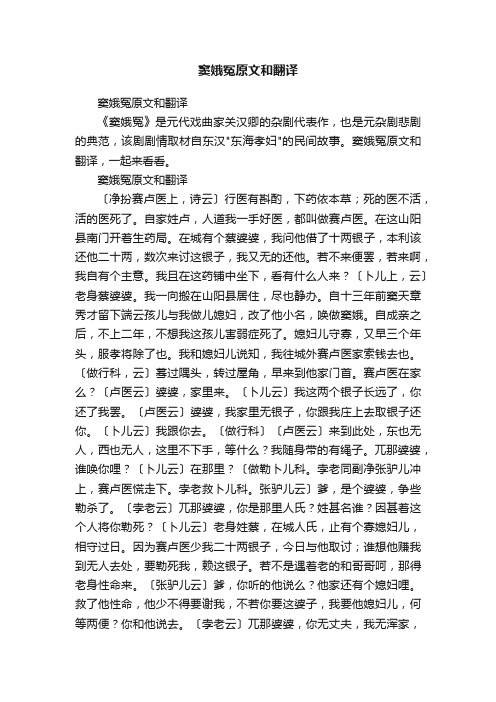
窦娥冤原文和翻译窦娥冤原文和翻译《窦娥冤》是元代戏曲家关汉卿的杂剧代表作,也是元杂剧悲剧的典范,该剧剧情取材自东汉"东海孝妇"的民间故事。
窦娥冤原文和翻译,一起来看看。
窦娥冤原文和翻译〔净扮赛卢医上,诗云〕行医有斟酌,下药依本草;死的医不活,活的医死了。
自家姓卢,人道我一手好医,都叫做赛卢医。
在这山阳县南门开着生药局。
在城有个蔡婆婆,我问他借了十两银子,本利该还他二十两,数次来讨这银子,我又无的还他。
若不来便罢,若来啊,我自有个主意。
我且在这药铺中坐下,看有什么人来?〔卜儿上,云〕老身蔡婆婆。
我一向搬在山阳县居住,尽也静办。
自十三年前窦天章秀才留下端云孩儿与我做儿媳妇,改了他小名,唤做窦娥。
自成亲之后,不上二年,不想我这孩儿害弱症死了。
媳妇儿守寡,又早三个年头,服孝将除了也。
我和媳妇儿说知,我往城外赛卢医家索钱去也。
〔做行科,云〕蓦过隅头,转过屋角,早来到他家门首。
赛卢医在家么?〔卢医云〕婆婆,家里来。
〔卜儿云〕我这两个银子长远了,你还了我罢。
〔卢医云〕婆婆,我家里无银子,你跟我庄上去取银子还你。
〔卜儿云〕我跟你去。
〔做行科〕〔卢医云〕来到此处,东也无人,西也无人,这里不下手,等什么?我随身带的有绳子。
兀那婆婆,谁唤你哩?〔卜儿云〕在那里?〔做勒卜儿科。
孛老同副净张驴儿冲上,赛卢医慌走下。
孛老救卜儿科。
张驴儿云〕爹,是个婆婆,争些勒杀了。
〔孛老云〕兀那婆婆,你是那里人氏?姓甚名谁?因甚着这个人将你勒死?〔卜儿云〕老身姓蔡,在城人氏,止有个寡媳妇儿,相守过日。
因为赛卢医少我二十两银子,今日与他取讨;谁想他赚我到无人去处,要勒死我,赖这银子。
若不是遇着老的和哥哥呵,那得老身性命来。
〔张驴儿云〕爹,你听的他说么?他家还有个媳妇哩。
救了他性命,他少不得要谢我,不若你要这婆子,我要他媳妇儿,何等两便?你和他说去。
〔孛老云〕兀那婆婆,你无丈夫,我无浑家,你肯与我做个老婆,意下如何?〔卜儿云〕是何言语!待我回家多备些钱钞相谢。
语文版高中语文必修四 9《窦娥冤(选场)》课文对译

【快活三】可怜我窦娥念被窦官娥府葫糊芦里提糊当涂罪地愆判,了念死罪,可怜 窦娥身首不完全, 念窦娥从前已往干家缘,婆婆也,
我窦娥身首异处无全尸,可怜我窦娥多年来操劳家务,婆婆呀,
你只看窦娥少爷无 娘 面。 你就看在我自小没爹没娘的情分上。
糊葫里芦糊提涂:的当意时思的。口语,
当:承受,承当。罪愆qiān:罪恶,罪过。从前已往: 同义复用。以前,既往。干家缘:料理家务。家缘,家计。
哭科,云孩儿放心,这个老身都记得。天哪,这不痛杀我吗! 正旦唱婆婆也,再也不要啼啼哭哭,烦烦恼恼,怨气冲天。 正旦唱婆婆呀,你再也不要啼啼哭哭,烦烦恼恼,怨气冲天。
这都是我做窦娥的没时没 运,不明不暗, 负屈 这都是做窦娥的生不逢时且没有好运气,糊里糊涂,蒙受委屈
衔含有血冤冤。。烈运:气烧,。命荐运:。祭不奠明,不超暗度:亡糊灵里。糊时涂:。时负机:。蒙运受:。
【
一煞Βιβλιοθήκη 】你道是天公不可期,人心不可怜,不知
你以为对苍天不能有期盼,人心不值得可怜,你不知道
皇天也肯从人愿。做甚么三年不见甘霖降, 也只
皇天也会随人愿。为什么三年竟然不见下及时雨?那只是
为东海曾经孝妇 冤。如今轮到你山阳县。这
因为东海曾经有位孝妇蒙受深冤。如今却轮到你山阳县。这
都是 官吏每无心 正法,使百姓有口难言。
好贤人和愚坏人枉白做做天天!!哎哎,,只只落落得得两我泪两眼泪涟水涟涟。涟。合糊:突应:该同。
“糊涂”,这里是“混淆”的意思。跖:传说是春秋时期一个名字叫 跖的大盗,被称为“盗跖”。颜渊:孔子的弟子,被推崇为“贤人”。 盗跖、颜渊,这里泛指坏人和好人。寿延:寿长。顺水推船:比喻 乘便行事,此处是“趋炎附势”的意思。错勘:错误地判断。枉:
窦娥冤原文和翻译

窦娥冤原文和翻译窦娥冤原文和翻译《窦娥冤》是元代戏曲家关汉卿的杂剧代表作,也是元杂剧悲剧的典范,该剧剧情取材自东汉"东海孝妇"的民间故事。
窦娥冤原文和翻译,一起来看看。
窦娥冤原文和翻译〔净扮赛卢医上,诗云〕行医有斟酌,下药依本草;死的医不活,活的医死了。
自家姓卢,人道我一手好医,都叫做赛卢医。
在这山阳县南门开着生药局。
在城有个蔡婆婆,我问他借了十两银子,本利该还他二十两,数次来讨这银子,我又无的还他。
若不来便罢,若来啊,我自有个主意。
我且在这药铺中坐下,看有什么人来?〔卜儿上,云〕老身蔡婆婆。
我一向搬在山阳县居住,尽也静办。
自十三年前窦天章秀才留下端云孩儿与我做儿媳妇,改了他小名,唤做窦娥。
自成亲之后,不上二年,不想我这孩儿害弱症死了。
媳妇儿守寡,又早三个年头,服孝将除了也。
我和媳妇儿说知,我往城外赛卢医家索钱去也。
〔做行科,云〕蓦过隅头,转过屋角,早来到他家门首。
赛卢医在家么?〔卢医云〕婆婆,家里来。
〔卜儿云〕我这两个银子长远了,你还了我罢。
〔卢医云〕婆婆,我家里无银子,你跟我庄上去取银子还你。
〔卜儿云〕我跟你去。
〔做行科〕〔卢医云〕来到此处,东也无人,西也无人,这里不下手,等什么?我随身带的有绳子。
兀那婆婆,谁唤你哩?〔卜儿云〕在那里?〔做勒卜儿科。
孛老同副净张驴儿冲上,赛卢医慌走下。
孛老救卜儿科。
张驴儿云〕爹,是个婆婆,争些勒杀了。
〔孛老云〕兀那婆婆,你是那里人氏?姓甚名谁?因甚着这个人将你勒死?〔卜儿云〕老身姓蔡,在城人氏,止有个寡媳妇儿,相守过日。
因为赛卢医少我二十两银子,今日与他取讨;谁想他赚我到无人去处,要勒死我,赖这银子。
若不是遇着老的和哥哥呵,那得老身性命来。
〔张驴儿云〕爹,你听的他说么?他家还有个媳妇哩。
救了他性命,他少不得要谢我,不若你要这婆子,我要他媳妇儿,何等两便?你和他说去。
〔孛老云〕兀那婆婆,你无丈夫,我无浑家,你肯与我做个老婆,意下如何?〔卜儿云〕是何言语!待我回家多备些钱钞相谢。
窦娥冤第三折翻译
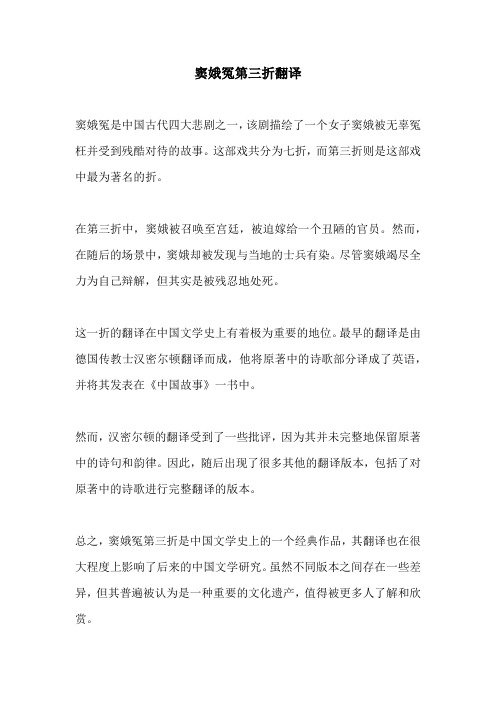
窦娥冤第三折翻译
窦娥冤是中国古代四大悲剧之一,该剧描绘了一个女子窦娥被无辜冤枉并受到残酷对待的故事。
这部戏共分为七折,而第三折则是这部戏中最为著名的折。
在第三折中,窦娥被召唤至宫廷,被迫嫁给一个丑陋的官员。
然而,在随后的场景中,窦娥却被发现与当地的士兵有染。
尽管窦娥竭尽全力为自己辩解,但其实是被残忍地处死。
这一折的翻译在中国文学史上有着极为重要的地位。
最早的翻译是由德国传教士汉密尔顿翻译而成,他将原著中的诗歌部分译成了英语,并将其发表在《中国故事》一书中。
然而,汉密尔顿的翻译受到了一些批评,因为其并未完整地保留原著中的诗句和韵律。
因此,随后出现了很多其他的翻译版本,包括了对原著中的诗歌进行完整翻译的版本。
总之,窦娥冤第三折是中国文学史上的一个经典作品,其翻译也在很大程度上影响了后来的中国文学研究。
虽然不同版本之间存在一些差异,但其普遍被认为是一种重要的文化遗产,值得被更多人了解和欣赏。
元代关汉卿杂剧代表作窦娥冤赏析
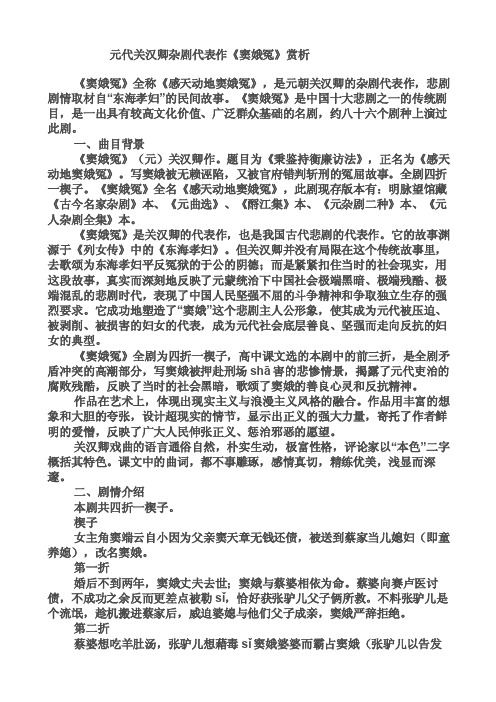
元代关汉卿杂剧代表作《窦娥冤》赏析《窦娥冤》全称《感天动地窦娥冤》,是元朝关汉卿的杂剧代表作,悲剧剧情取材自“东海孝妇”的民间故事。
《窦娥冤》是中国十大悲剧之一的传统剧目,是一出具有较高文化价值、广泛群众基础的名剧,约八十六个剧种上演过此剧。
一、曲目背景《窦娥冤》(元)关汉卿作。
题目为《秉鉴持衡廉访法》,正名为《感天动地窦娥冤》。
写窦娥被无赖诬陷,又被官府错判斩刑的冤屈故事。
全剧四折一楔子。
《窦娥冤》全名《感天动地窦娥冤》,此剧现存版本有:明脉望馆藏《古今名家杂剧》本、《元曲选》、《酹江集》本、《元杂剧二种》本、《元人杂剧全集》本。
《窦娥冤》是关汉卿的代表作,也是我国古代悲剧的代表作。
它的故事渊源于《列女传》中的《东海孝妇》。
但关汉卿并没有局限在这个传统故事里,去歌颂为东海孝妇平反冤狱的于公的阴德;而是紧紧扣住当时的社会现实,用这段故事,真实而深刻地反映了元蒙统治下中国社会极端黑暗、极端残酷、极端混乱的悲剧时代,表现了中国人民坚强不屈的斗争精神和争取独立生存的强烈要求。
它成功地塑造了“窦娥”这个悲剧主人公形象,使其成为元代被压迫、被剥削、被损害的妇女的代表,成为元代社会底层善良、坚强而走向反抗的妇女的典型。
《窦娥冤》全剧为四折一楔子,高中课文选的本剧中的前三折,是全剧矛盾冲突的高潮部分,写窦娥被押赴刑场shā害的悲惨情景,揭露了元代吏治的腐败残酷,反映了当时的社会黑暗,歌颂了窦娥的善良心灵和反抗精神。
作品在艺术上,体现出现实主义与浪漫主义风格的融合。
作品用丰富的想象和大胆的夸张,设计超现实的情节,显示出正义的强大力量,寄托了作者鲜明的爱憎,反映了广大人民伸张正义、惩治邪恶的愿望。
关汉卿戏曲的语言通俗自然,朴实生动,极富性格,评论家以“本色”二字概括其特色。
课文中的曲词,都不事雕琢,感情真切,精练优美,浅显而深邃。
二、剧情介绍本剧共四折一楔子。
楔子女主角窦端云自小因为父亲窦天章无钱还债,被送到蔡家当儿媳妇(即童养媳),改名窦娥。
中国文化典籍英语翻译及赏析37:元曲杂剧《窦娥冤(节选)》精选全文完整版
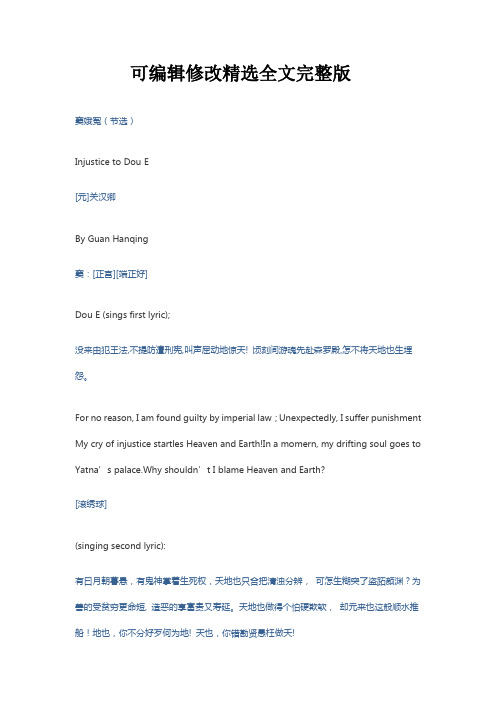
可编辑修改精选全文完整版窦娥冤(节选)Injustice to Dou E[元]关汉卿By Guan Hanqing窦:[正宫][端正好]Dou E (sings first lyric);没来由犯王法,不提防遭刑宪,叫声屈动地惊天! 顷刻间游魂先赴森罗殿,怎不将天地也生埋怨。
For no reason, I am found guilty by imperial law;Unexpectedly, I suffer punishment My cry of injustice startles Heaven and Earth!In a momern, my drifting soul goes to Yatna’s palace.Why shouldn’t I blame Heaven and Earth?[滚绣球](singing second lyric):有曰月朝暮悬,有鬼神掌着生死权,夭地也只合把清浊分辨,可怎生糊突了盗跖颜渊?为善的受贫穷更命短, 造恶的享富贵又寿延。
天地也做得个怕硬欺软,却元来也这般顺水推船!地也,你不分好歹何为地! 天也,你错勘贤愚枉做夭!The sun and moon hang aloft by day and by night;Ghosts and spirits hold the power over lives and deaths.Heaven and Barth should distinguish the pure from the foul; But how they have mixed up Bandit Zhi and Yan Yuan!The good suffer poverty and short life;The wicked enjoy wealthy nobility, and long life. Even Heaven and Earth have come to fear the strong and oppress the weak. They, after all, only push the boats following the current.Oh Earth, as you fail to discriminate between good and evil.How can you function as Earth?Oh Heaven, in mistaking the sage and ibe fool,You are called Heaven in vain!。
窦娥冤妀编作文400字
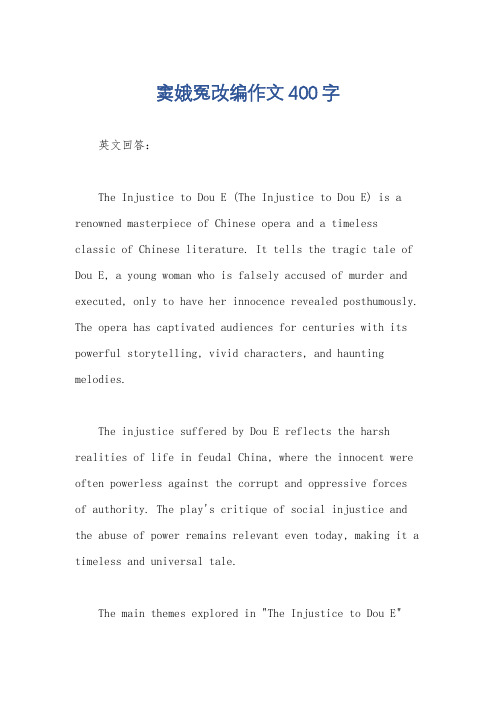
窦娥冤妀编作文400字英文回答:The Injustice to Dou E (The Injustice to Dou E) is a renowned masterpiece of Chinese opera and a timelessclassic of Chinese literature. It tells the tragic tale of Dou E, a young woman who is falsely accused of murder and executed, only to have her innocence revealed posthumously. The opera has captivated audiences for centuries with its powerful storytelling, vivid characters, and haunting melodies.The injustice suffered by Dou E reflects the harsh realities of life in feudal China, where the innocent were often powerless against the corrupt and oppressive forces of authority. The play's critique of social injustice and the abuse of power remains relevant even today, making it a timeless and universal tale.The main themes explored in "The Injustice to Dou E"include the triumph of justice over evil, the power of supernatural forces, and the importance of compassion and empathy. The opera is also a powerful indictment of the flaws in the Chinese legal system and the need for reform.中文回答:《窦娥冤》,又名《窦娥冤屈》,是中国戏曲的经典名著,元代戏曲家关汉卿的代表作之一。
窦娥冤(杂剧)
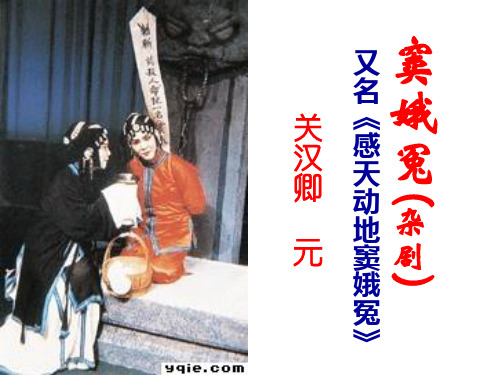
(2)角色:扮演的角色有末、旦、净、丑 等。 元杂剧每本戏只有一个主角,男主角称正末, 女主角称正旦。此外,男配角有副末(次主 角)、外末(老年男子)、小末(少年)等; 女配角有副旦、外旦、小旦等。 净:俗称“大花脸”,大都扮演性格、相貌 上有特异之处的人物。如张飞、李逵。 丑:俗称“小花脸”,大抵扮演男次要人物。 此外,还有孛(bó)老(老头儿)、卜儿 (老妇人)、孤(官员)、徕儿(小厮)。
二、杂剧
• 在音乐上,杂剧的每折用同一宫调的若 干曲牌组成套曲。楔子只能用一二支小 令,不能用套曲。宫调,即调式,相当 于现代音乐的C调D调等。曲牌,是曲调 的名称,每个曲牌都属于一定的宫调。 剧本中每套曲子的第一支曲子前面都标 明宫调。如《窦娥冤》第三折第一支曲 子标示的【正宫】【端正好】,表示这 一折自【端正好】以下各曲均属【正 宫】。
中国十大古典悲剧:
《窦娥冤》-元· 关汉卿《赵氏孤儿》-元· 纪 君祥 《精忠旗》-明· 冯梦龙 《清忠谱》-清· 李 玉 《桃花扇》-清· 孔尚任 《汉宫秋》-元· 马致 远 《琵琶记》-明· 高则诚 《娇红记》明· 孟称 舜 《长生殿》清· 昇 《雷峰塔》清· 洪 方成 培
中国十大古典喜剧:
关 汉 卿 元
又 名 《 感 天 动 地 窦 娥 冤 》
窦 娥 冤
(
杂 剧
)
关汉卿:元代杂剧作家, 号已斋叟,大都(今北京) 人。是我国戏剧史上最早 也最伟大的戏剧作家。其 中《窦娥冤》、 《拜月 亭》、 《单刀会》 、《望 江亭》、 《救风尘》等, 是他的代表作。 关汉卿、郑光祖、白朴、 马致远一同被称为“元曲 四大家”。
【思考四】窦娥死前反复叮嘱婆 婆要奠祭她,这有何作用?
【第三部分注释】
罚:发 半星儿:半点儿 等:让(介词) 亢旱:亢,极 湛:清明 每:这里同“们”
窦娥冤作文素材200字
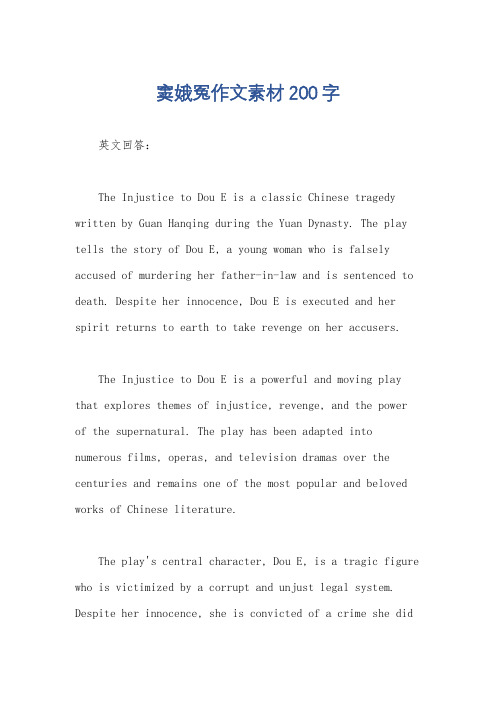
窦娥冤作文素材200字英文回答:The Injustice to Dou E is a classic Chinese tragedy written by Guan Hanqing during the Yuan Dynasty. The play tells the story of Dou E, a young woman who is falsely accused of murdering her father-in-law and is sentenced to death. Despite her innocence, Dou E is executed and her spirit returns to earth to take revenge on her accusers.The Injustice to Dou E is a powerful and moving play that explores themes of injustice, revenge, and the power of the supernatural. The play has been adapted into numerous films, operas, and television dramas over the centuries and remains one of the most popular and beloved works of Chinese literature.The play's central character, Dou E, is a tragic figure who is victimized by a corrupt and unjust legal system. Despite her innocence, she is convicted of a crime she didnot commit and is executed. Dou E's death is a miscarriage of justice that shocks and angers the audience.The Injustice to Dou E is a powerful indictment of the corrupt and unjust legal system of the Yuan Dynasty. The play shows how the innocent can be easily victimized by those in power and how the law can be used to oppress the weak and vulnerable.The play also explores the theme of revenge. Dou E's spirit returns to earth to take revenge on her accusers. Her revenge is bloody and brutal, but it is also understandable. Dou E has been wronged and she wants to make those who wronged her pay.The Injustice to Dou E is a powerful and moving play that explores important themes of injustice, revenge, and the power of the supernatural. The play is a classic of Chinese literature and remains popular today.中文回答:《窦娥冤》是关汉卿在元朝创作的经典中国悲剧。
窦娥冤善良表现作文
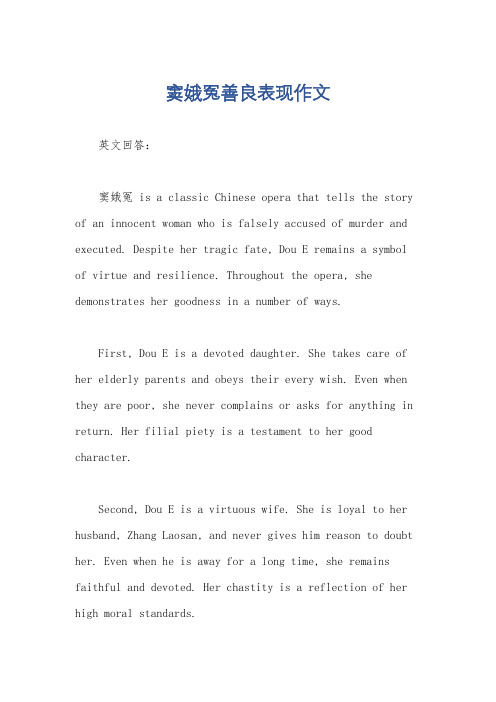
窦娥冤善良表现作文英文回答:窦娥冤 is a classic Chinese opera that tells the story of an innocent woman who is falsely accused of murder and executed. Despite her tragic fate, Dou E remains a symbol of virtue and resilience. Throughout the opera, she demonstrates her goodness in a number of ways.First, Dou E is a devoted daughter. She takes care of her elderly parents and obeys their every wish. Even when they are poor, she never complains or asks for anything in return. Her filial piety is a testament to her good character.Second, Dou E is a virtuous wife. She is loyal to her husband, Zhang Laosan, and never gives him reason to doubt her. Even when he is away for a long time, she remains faithful and devoted. Her chastity is a reflection of her high moral standards.Third, Dou E is a kind and compassionate person. She is always willing to help others, even those who have wronged her. When Zhang Laosan's brother, Zhang Guangfu, tries to force himself on her, she resists and reports him to the authorities. Her courage and integrity are a testament to her strength of character.Finally, Dou E is a forgiving person. Even after she is falsely accused and executed, she does not hold a grudge against her enemies. Instead, she prays for them to find peace and happiness. Her forgiveness is a testament to her spiritual growth and her ultimate triumph over evil.中文回答:窦娥冤是一部经典的中国戏曲,讲述了一个无辜女子被冤枉谋杀和处决的故事。
窦娥冤戏曲独特魅力作文

窦娥冤戏曲独特魅力作文英文回答:The unique charm of the Peking Opera "Dou E Yuan" lies in its exquisite artistry and profound cultural significance.On the artistic level, the opera boasts a captivating plot, vivid characters, and stunning visuals. The story of Dou E, a young woman who is unjustly accused of murder and executed, has captivated audiences for centuries with its themes of injustice, sacrifice, and redemption. The characters, such as Dou E, the virtuous heroine; Zhang Lun, the corrupt official; and Chunyang, the immortal who helps Dou E, are richly drawn and unforgettable. The opera's visual spectacle, from the elaborate costumes to the dynamic stage movements, creates an immersive and unforgettable experience.Beyond its artistic merits, "Dou E Yuan" also holdsprofound cultural significance. The opera is a powerful allegory for the social and political injustices ofimperial China. Dou E's unjust execution represents the plight of countless innocent victims throughout history.The opera's message of retribution and the eventual triumph of good over evil has resonated with Chinese audiences for generations.中文回答:京剧《窦娥冤》的独特魅力在于其精湛的艺术性和深刻的文化内涵。
窦娥冤 小作文整句
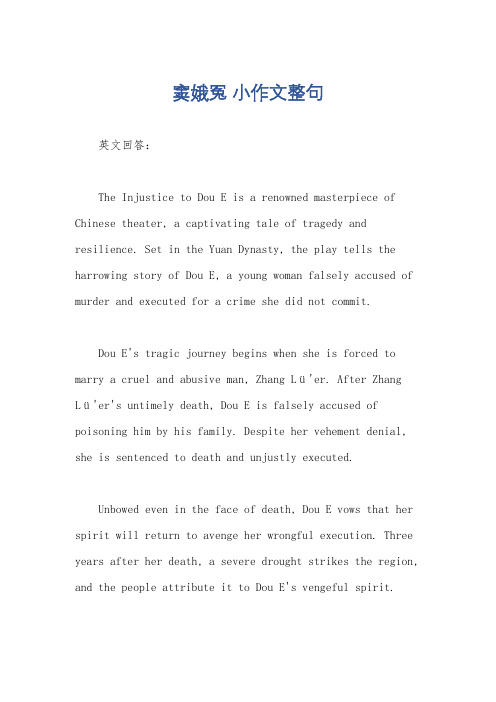
窦娥冤小作文整句英文回答:The Injustice to Dou E is a renowned masterpiece of Chinese theater, a captivating tale of tragedy and resilience. Set in the Yuan Dynasty, the play tells the harrowing story of Dou E, a young woman falsely accused of murder and executed for a crime she did not commit.Dou E's tragic journey begins when she is forced to marry a cruel and abusive man, Zhang Lü'er. After ZhangLü'er's untimely death, Dou E is falsely accused of poisoning him by his family. Despite her vehement denial, she is sentenced to death and unjustly executed.Unbowed even in the face of death, Dou E vows that her spirit will return to avenge her wrongful execution. Three years after her death, a severe drought strikes the region, and the people attribute it to Dou E's vengeful spirit.The play concludes with Dou E finally receiving justice, as the true culprit confesses to the murder. However, the price of justice is high, as Dou E has already paid the ultimate sacrifice.The Injustice to Dou E transcends its tragic plotline, becoming a powerful exploration of themes such as the resilience of the human spirit, the search for justice, and the consequences of wrongful accusations. Through Dou E's character, the play exposes the injustices that oftenbefall the innocent and highlights the importance of speaking out against oppression.中文回答:《窦娥冤》是元代著名杂剧,也是中国戏剧史上的经典杰作。
窦娥冤戏剧评论作文

窦娥冤戏剧评论作文英文回答:The Yuan dynasty drama "竇娥冤" by Guan Hanqing is a poignant and tragic tale that explores themes of injustice, morality, and the power of the supernatural in 13th-century China. The play follows the life of Dou E, a young woman who is falsely accused of murder and executed. Her unwavering innocence and the miraculous events that follow her death serve as a powerful indictment of the corrupt legal system and a testament to the enduring power of justice and compassion."竇娥冤" is a masterpiece of Chinese theater, showcasing the genre's characteristic use of symbolism, music, and acrobatic elements. The play's compelling plot and vivid characters have made it a timeless classic, enduringly popular with audiences around the world.The character of Dou E embodies the virtues of loyalty,filial piety, and unwavering innocence. Despite her tragic fate, she remains a symbol of hope and resilience,inspiring audiences to believe in the ultimate triumph of good over evil.Guan Hanqing's "竇娥冤" is not only a captivating theatrical experience but also a profound exploration of the human condition. Through its exploration of injustice, morality, and the supernatural, the play challenges audiences to question their own beliefs and values, leaving a lasting impact long after the curtain falls.中文回答:《窦娥冤》剧评。
窦娥冤作文素材200字
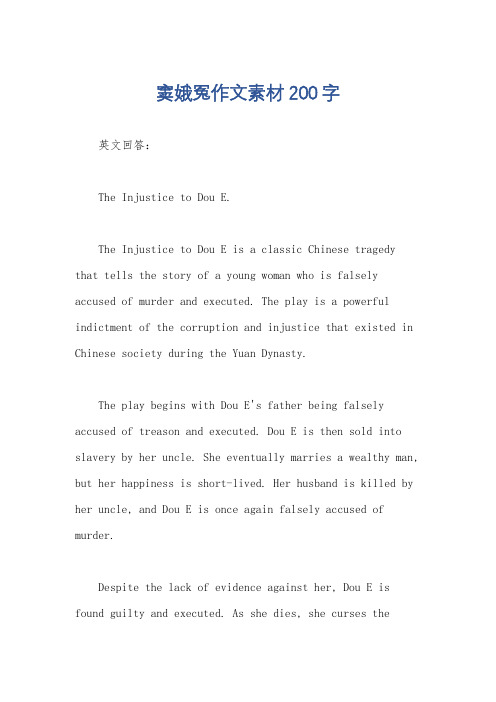
窦娥冤作文素材200字英文回答:The Injustice to Dou E.The Injustice to Dou E is a classic Chinese tragedythat tells the story of a young woman who is falsely accused of murder and executed. The play is a powerful indictment of the corruption and injustice that existed in Chinese society during the Yuan Dynasty.The play begins with Dou E's father being falsely accused of treason and executed. Dou E is then sold into slavery by her uncle. She eventually marries a wealthy man, but her happiness is short-lived. Her husband is killed by her uncle, and Dou E is once again falsely accused of murder.Despite the lack of evidence against her, Dou E is found guilty and executed. As she dies, she curses theheavens, vowing that a great drought will come upon the land as a sign of her innocence.The curse comes true, and the land is ravaged by a drought. The emperor, realizing that Dou E was innocent, orders her case to be reopened. Her uncle is found guilty of murder and executed.The Injustice to Dou E is a powerful and moving play that exposes the injustices that existed in Chinese society during the Yuan Dynasty. The play also highlights the importance of justice and the need to hold those in power accountable for their actions.中文回答:窦娥冤。
元曲英文介绍
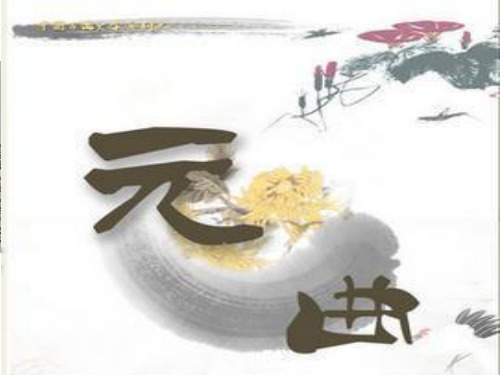
Basic structure :
Four arts(折,四折一般分别是故事的开端、发展、高潮、结局) An opeaning piece(楔子)
Key character:
Dan(旦a female role) Mo(末a male role) Jing(净a male,often a disreputable名誉不好的)
Zheng Guangzu, courtesy name is Dehui,is an important writer in the late Yuan dynasty. Master works:
《迷青琐倩女离魂》、《刍梅香翰林风月》、《醉思乡王粲登楼》
刍梅香翰林风月
Four tragedies of yuanzaju
关汉卿
白朴
郑光祖
马致远
关汉卿
▲
Guan Hanqing , sobriquet(绰号) “the Oldman of the Studio” (斋叟Zhāisǒu), was a notable(著名的) Chinese playwright and poet in the Yuan Dynasty. He has been described as among the most prolific (多产的) and highly regarded dramatists(剧作家) of the Yuan period. Guan spent much of his later life in Dadu and produced about 65 plays, mostly in the vernacular(社会 习惯语,方言)of the time. He wrote many outstanding plays and was addressed as the leading dramatist of the Yuan Dynasty.
窦娥冤 (dòu é yuān)—中国历史著述英文版
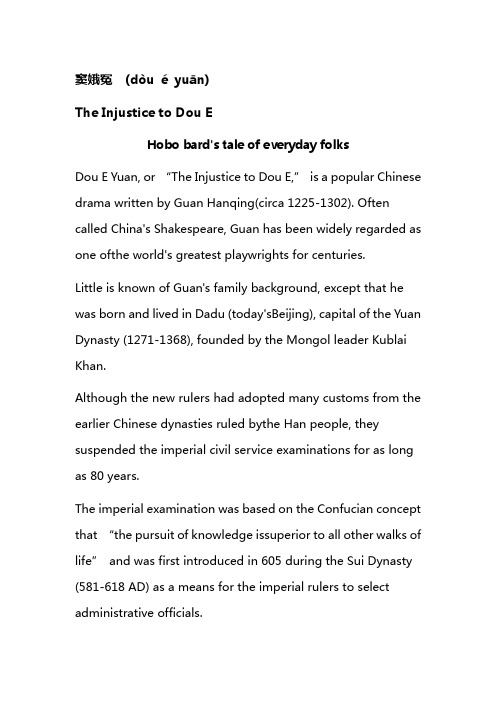
窦娥冤(dòu éyuān)The Injustice to Dou EHobo bard's tale of everyday folksDou E Yuan, or “The Injustice to Dou E,”is a popular Chinese drama written by Guan Hanqing(circa 1225-1302). Often called China's Shakespeare, Guan has been widely regarded as one ofthe world's greatest playwrights for centuries.Little is known of Guan's family background, except that he was born and lived in Dadu (today'sBeijing), capital of the Yuan Dynasty (1271-1368), founded by the Mongol leader Kublai Khan.Although the new rulers had adopted many customs from the earlier Chinese dynasties ruled bythe Han people, they suspended the imperial civil service examinations for as long as 80 years.The imperial examination was based on the Confucian concept that “the pursuit of knowledge issuperior to all other walks of life”and was first introduced in 605 during the Sui Dynasty (581-618 AD) as a means for the imperial rulers to select administrative officials.It became widely considered by intellectuals as the only path that would lead them to socialstatus, wealth and fame.But during Guan's time, with the suspension of the imperial civil service examinations, the socialstatus of intellectuals was downgraded to the same level as beggars and prostitutes. So, as a scholar, Guan saw no future in trying to pursue a career in officialdom, and instead hespent a lot of his time at low-class venues.According to rare and sketchy records, Guan was a witty, knowledgeable and humorous man,plus a versatile artist. He was deeply versed in poetry, music, dancing, chess and hunting. Hecalled himself “the leader of all hobos in the world”and described himself as “a hard copperbean that can never be crushed.”At one time, Guan worked as a doctor in the imperial hospital. However, he was not interested inmedicine; instead the reluctant medic was very enthusiastic about play writing. Guan wrote about 65 plays and most of them are about the lives, passions and sufferings of theordinary people. And all his plays were written in the vernacular Chinese of the time.Today, 18 of his plays are in existence with some still being performed. Among them, “TheInjustice to Dou E”, arguably the best of Guan's works, remains the most popular. The storygoes like this:Many years previously, Dou E was sold by her father, a poor scholar, to a family as a child bride.Her father used the proceeds to pay to travel to the capital to sit the imperial civil serviceexamination.Dou E's husband died two years after their formal marriage and the young widow had to live withher mother-in-law. Around this time, a no-good type called Mule Zhang and his father appeared. He wanted tomarry the young widow, butshe refused.Slighted by this rejection, Mule Zhang decided to poison Dou E's mother-in-law and then forcethe widow to marry him. However, in the attempt, Mule Zhang fatally poisoned his own father bymistake.Mule Zhang immediately accused the young widow of murdering his father and Dou E was laterwrongly convicted of the crime by some local corrupt officials.Before her execution, Dou E swore that three abnormal phenomena would occur to prove herinnocence: first, blood would rain down from the sky; second, it would snow in June; and third,where she was executed would be hit by a three-year drought.These three predictions all came to pass after Dou E was executed.Later, Dou E appeared in her father's dreams to tell her story. Her father, already a middle-ranking government official, eventually brought the corrupt court official and Mule Zhang to justiceand had his daughter vindicated.Even today, the phrase “snowing in June”is still widely usedamong Chinese speakers as ametaphor for a miscarriage of justice.。
- 1、下载文档前请自行甄别文档内容的完整性,平台不提供额外的编辑、内容补充、找答案等附加服务。
- 2、"仅部分预览"的文档,不可在线预览部分如存在完整性等问题,可反馈申请退款(可完整预览的文档不适用该条件!)。
- 3、如文档侵犯您的权益,请联系客服反馈,我们会尽快为您处理(人工客服工作时间:9:00-18:30)。
窦娥冤(节选)
Injustice to Dou E
[元]关汉卿
By Guan Hanqing
窦:[正宫][端正好]
Dou E (sings first lyric);
没来由犯王法,不提防遭刑宪,叫声屈动地惊天! 顷刻间游魂先赴森罗殿,怎不将天地也生埋怨。
For no reason, I am found guilty by imperial law;Unexpectedly, I suffer punishment My cry of injustice startles Heaven and Earth!In a momern, my drifting soul goes to Yatna’s palace.Why shouldn’t I blame Heaven and Earth?
[滚绣球]
(singing second lyric):
有曰月朝暮悬,有鬼神掌着生死权,夭地也只合把清浊分辨,可怎生糊突了盗跖颜渊?为善的受贫穷更命短, 造恶的享富贵又寿延。
天地也做得个怕硬欺软,却元来也这般顺水推船!地也,你不分好歹何为地! 天也,你错勘贤愚枉做夭!
The sun and moon hang aloft by day and by night;Ghosts and spirits hold the power over lives and deaths.Heaven and Barth should distinguish the pure from the foul; But how they have mixed up Bandit Zhi and Yan Yuan!The good suffer poverty and short life;The wicked enjoy wealthy nobility, and long life. Even Heaven and Earth have come to fear the strong and oppress the weak. They, after all, only push the boats following the current.Oh Earth, as you fail to discriminate between good and evil.How can you function as Earth?Oh Heaven, in mistaking the sage and ibe fool,You are called Heaven in vain!。
